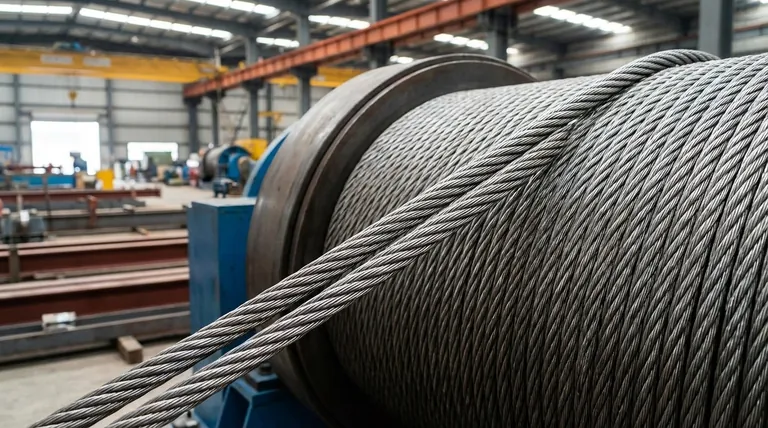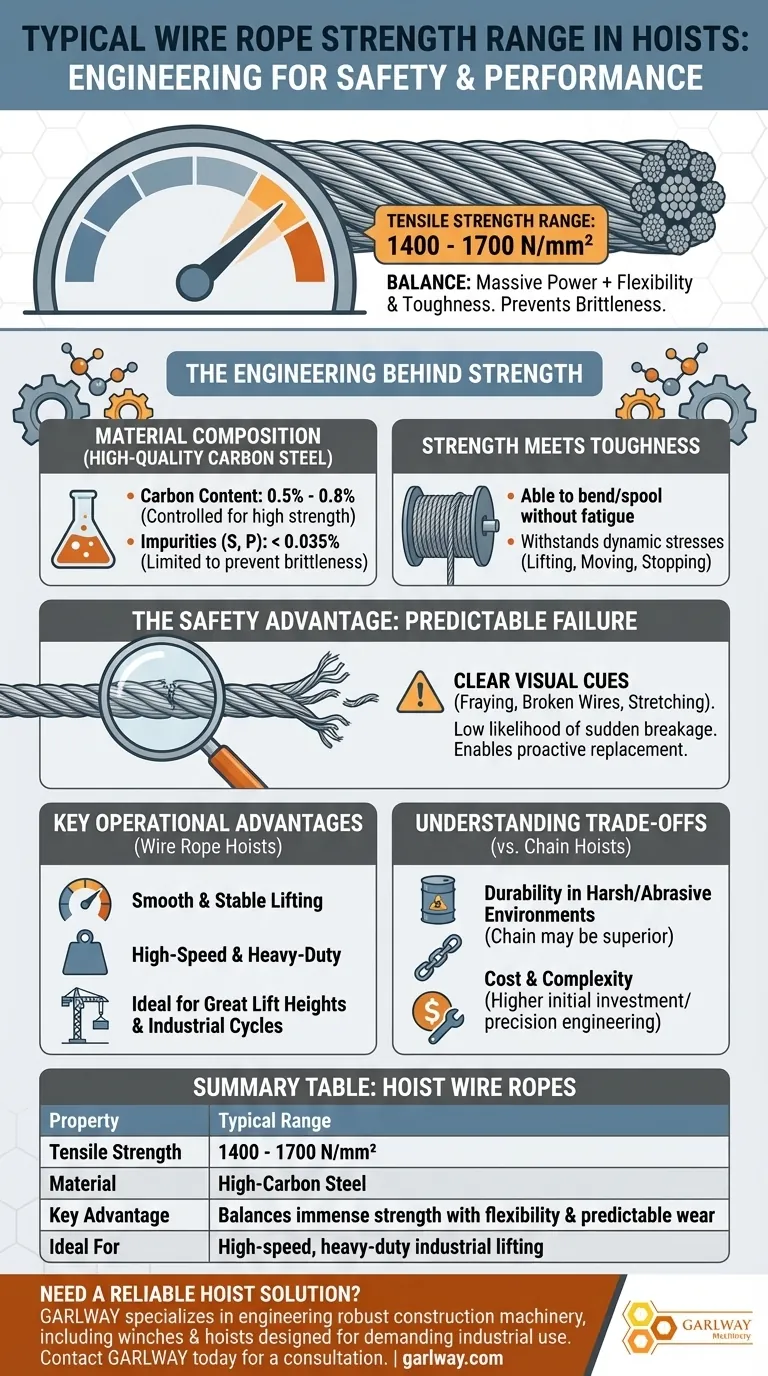For hoists, the typical tensile strength of the wire ropes used falls within a specific, engineered range. These ropes are designed to balance immense load-bearing capacity with the flexibility and toughness required for safe and repeated use.
The core principle behind hoist wire rope design is achieving a balance. The specified strength of 1400 to 1700 N/mm² provides the massive power needed for lifting, but it is the underlying material science that prevents this strength from becoming a liability through brittleness.

The Engineering Behind Hoist Rope Strength
A hoist wire rope's performance is not just a measure of its raw power. It is a direct result of its carefully controlled material composition and construction, which are designed to produce a predictable and safe operational life.
The Role of Material Composition
Hoist wire ropes are typically made from high-quality carbon steel. The carbon content is precisely controlled, usually between 0.5% and 0.8%.
This level of carbon provides the high tensile strength required for heavy lifting applications.
Furthermore, impurities like sulfur and phosphorus are strictly limited to below 0.035%. Exceeding this threshold would make the steel brittle and susceptible to cracking under load.
Balancing Strength and Toughness
While high strength is essential, it cannot come at the expense of toughness and flexibility.
A hoist rope must be able to bend and spool around drums and sheaves without fatiguing. The manufacturing process instills the toughness needed to withstand the dynamic stresses of lifting, moving, and stopping a load.
The Advantage of Predictable Failure
One of the most critical safety features of a wire rope is its "forgiving" nature. Unlike some materials that can fail suddenly and catastrophically, a wire rope provides clear visual cues of wear.
Fraying, broken outer wires, and stretching are all indicators that the rope is nearing the end of its service life, allowing for replacement before a dangerous failure occurs. The references note this as a low likelihood of sudden breakage.
Key Operational Advantages
The specific properties of steel wire rope make it exceptionally well-suited for modern electric hoists, which are designed for demanding tasks.
Smooth and Stable Lifting
The construction of a wire rope allows it to run smoothly over sheaves and onto the hoist drum. This ensures stable, predictable movement, which is critical when handling heavy or sensitive loads at significant heights.
High-Speed and Heavy-Duty Performance
Electric wire rope hoists are the industry standard for heavier loads and greater lift heights. Their design is optimized for rapid, repetitive lifting cycles in demanding industrial environments.
Understanding the Trade-offs
No single solution is perfect for every application. While wire rope hoists offer significant advantages, it's important to understand their limitations compared to alternatives like chain hoists.
Durability in Harsh Environments
In certain high-wear or chemically aggressive environments, a heavy-duty chain may offer superior durability and resistance to abrasion compared to a wire rope.
Cost and Complexity
Generally, wire rope hoist systems are more complex and carry a higher initial cost than their chain hoist counterparts. The precision engineering required for high-speed, heavy-lift applications is reflected in the price.
Making the Right Choice for Your Application
Selecting the correct lifting medium depends entirely on the operational demands and environment of the task at hand.
- If your primary focus is high-speed, heavy-duty lifting: The strength, stability, and speed of a wire rope hoist is the definitive choice for industrial performance.
- If your primary focus is maximum durability in abrasive conditions: You should evaluate whether a chain hoist might offer a more robust solution despite being slower.
- If your primary focus is operational safety and inspection: The predictable wear patterns of wire rope provide a clear advantage for maintenance schedules and preventing unexpected equipment failure.
Understanding these material properties is the first step toward ensuring safer, more efficient, and more reliable lifting operations.
Summary Table:
| Property | Typical Range for Hoist Wire Ropes |
|---|---|
| Tensile Strength | 1400 - 1700 N/mm² |
| Material | High-Carbon Steel |
| Key Advantage | Balances immense strength with flexibility and predictable wear |
| Ideal For | High-speed, heavy-duty industrial lifting applications |
Need a reliable hoist solution for your heavy-duty projects?
GARLWAY specializes in engineering robust construction machinery, including winches and hoists designed for demanding industrial use. Our solutions are built with the same material science principles that ensure strength, safety, and longevity in high-performance wire ropes.
Let us help you select the right equipment to enhance the safety and efficiency of your lifting operations. Contact GARLWAY today for a consultation and discover the difference professional-grade machinery can make.
Visual Guide

Related Products
- Portable Concrete Mixer Machine Equipment for Mixing Concrete
- Hydraulic Concrete Mixer Machine Cement Mixing Equipment for Mixture Concrete
- Ready Mixer Machine for Construction Ready Mix Machinery
- Commercial Construction Mixer Machine for Soil Cement Mixing Concrete
- HZS25 Best Cement Mixer for Quick Mix Concrete at Bunnings
People Also Ask
- How much concrete can you mix in a portable mixer? Maximize Efficiency on Small Jobs
- How long does it take to mix concrete in a portable mixer? Master the 60-Minute Rule
- What are the factors influencing choice of a concrete mixing plant? Key Considerations for Efficiency
- How much does a portable concrete mixer hold? A Guide to Choosing the Right Capacity
- How much concrete can you pour with a portable mixer? Find the Perfect Fit for Your Project


















